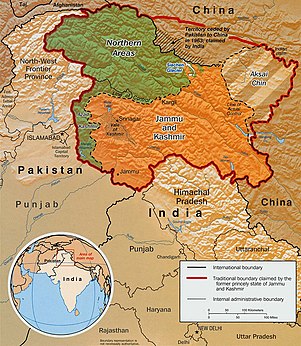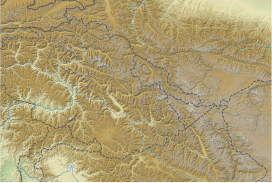Ghent Kangri
Appearance
| Ghent Kangri | |||
|---|---|---|---|
| Simplified Chinese | 根特崗日峰 | ||
| |||
Ghent Kangri (or Mount Ghent, Ghaint I) is a high peak near the north end of the Saltoro Mountains, a subrange of the Karakoram range. It is located west of the Siachen Glacier near the Actual Ground Position Line between India and Pakistan.
Ghent Kangri was first climbed on 4 June 1961, by Wolfgang Axt, a member of an Austrian expedition led by Erich Waschak, via the West Ridge. He climbed solo above the high camp.
According to the Himalayan Index, there have been three subsequent ascents of the peak, in 1977, 1980, and 1984.


See also
[edit]- Near the AGPL (Actual Ground Position Line)
- NJ9842, LoC ends and AGPL begins
- Gyong La
- Chumik Glacier
- Saltoro Mountains
- Saltoro Kangri
- Bilafond La
- Sia La
- Indira Col, AGPL ends at LAC
- Borders
- Actual Ground Position Line (AGPL)
- India–Pakistan International Border {IB)
- Line of Control {LoC)
- Line of Actual Control (LAC)
- Sir Creek (SC)
- Borders of China
- Borders of India
- Borders of Pakistan
- Conflicts
- Kashmir conflict
- Siachen conflict
- Sino-Indian conflict
- List of disputed territories of China
- List of disputed territories of India
- List of disputed territories of Pakistan
- Northern Areas
- Trans-Karakoram Tract
- Operations
- Operation Meghdoot, by India
- Operation Rajiv, by India
- Operation Safed Sagar, by India
- Other related topics
- Awards and decorations of the Indian Armed Forces
- Bana Singh, after whom Quaid Post was renamed to Bana Top
- Dafdar, westernmost town in Trans-Karakoram Tract
- India-China Border Roads
- Sino-Pakistan Agreement for transfer of Trans-Karakoram Tract to China
Sources
[edit]- Neate, Jill (1989). High Asia: an illustrated history of the 7,000 metre peaks. The Mountaineers.
- Jerzy Wala, Orographical Sketch Map of the Karakoram, Swiss Foundation for Alpine Research, 1990.




